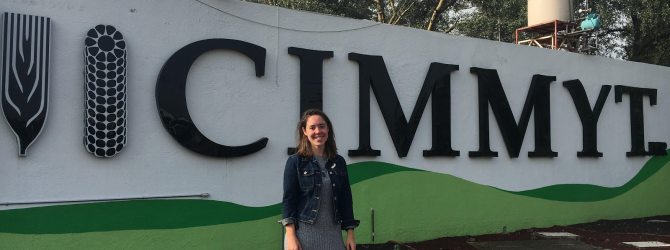Elizabeth Sweitzer is a second year CIPA fellow who is concentrating her studies on International Development, with a specific focus on food security. She also serves as the senior content editor for the Cornell Policy Review. Prior to joining CIPA, Elizabeth completed a Fulbright Fellowship in Brazil (‘15); she speaks both Spanish and Portuguese.This summer, Lizzy traveled to Mexico where she worked at CIMMYT, a seed research center for improved livelihoods. In this post, she shares more about her internship experience and her work at Cornell.
Where did you work this summer? What was your role?
During the summer holiday, I traveled to Texcoco, Mexico to work at a research center called CIMMYT. CIMMYT is a Spanish acronym for “International Wheat and Maize Improvement Center”, and its mission is Maize and Wheat Science for Improved Livelihoods.
I worked at CIMMYT’s headquarters in Texcoco in the Project Management Unit as a Junior Consultant. During my time there, I was charged with creating an online platform for CIMMYT’s project management training, creating user examples to help contextualize lessons, and working with different teams at CIMMYT with their project management needs.
Why did you choose this position?
While there were several opportunities for my summer internship, I ultimately decided to work at CIMMYT because I would obtain experience in my intended area of focus (international agricultural and rural development), gain training relevant to future work (I was certified in Project Management during my time there), and learn from a host of global professionals from seed scientists to economists about global food insecurity. My employer was also very accommodating, so from a logistical and economical standpoint, this position made the most sense for me.
What skill sets did you develop during your summer position?
The skill sets I truly honed during my internship include project management as well as food security in general.
Working in the project management unit, I learned how a large institution organizes and delegates tasks on projects. In particular, I gained a great deal of experience developing project proposals and understanding the components necessary to sell an idea of a project to sponsors. Through training and studying for my project management certification, I learned about managing international projects, fundamentals of project management, and ethics in project management. Being able to say that I am PMD Pro certified in Project Management is an incredible asset to my professional portfolio. I’m thrilled that I was able to gain these skills, as they are directly applicable to my studies in policy administration and will help with future professional experiences.
Further, my supervisor this summer encouraged me to meet scientists, economists, and other specialists across the headquarters to learn about the work CIMMYT does and how they interact with different teams. I really appreciated getting to speak with all these professionals and learn from them, as it helped to illustrate the sheer amount of detail and effort required to bring these projects to fruition. Not only did I understand the duties of the scientists, economists, and other specialists (like gender mainstreaming specialists) for projects, but I also learned about topics and concerns in global food insecurity that I wouldn’t have known about otherwise. I’m grateful to have had the chance to work with a welcoming group of individuals.
What skills did you build upon (or leverage) from your first year at CIPA?
Two courses in particular were deeply helpful for my internship: Monitoring and Evaluation of International Projects and Rural and Agricultural Development. In addition to these, knowledge of Microsoft Excel was an asset for my internship.
Monitoring and Evaluation with Professor Mathiason certainly helped prime me with topics relevant to project management, including developing logical frameworks, the importance of triangulation and data analysis, and project evaluation in general.
Further, my course with Professor Uphoff regarding Rural and Agricultural Development was useful in contextualizing rural development projects in project management. In my work at CIMMYT, I needed to find examples of projects which dealt with certain constraints and relay best practices. For example, projects that dealt with a great deal of risk or projects that experienced scarcity in time/resources/capital and how a project manager can remedy it. Uphoff’s class focused on case studies of a plethora of different programs, both successful and unsuccessful, which helped me develop examples for project management training.
Any other stories you’d like to share?
I loved the experience living and working in Mexico. While I had a hard commute, living in Mexico city was a blast, and I also had time to visit other parts of Mexico and enjoy great food, artwork and history.

What are you excited for this year coming back to Cornell?
I’m looking forward to taking additional classes in Nutrition, Global Health, and Economics to learn more about the importance of not just food security but nutrition security and public policy. It’s also great to be back in Ithaca to see all my friends and fellow colleagues who I haven’t seen all summer!
Prior to coming to CIPA, Lizzy performed public policy research and delivered data analysis for public policy seminars in Toronto, Canada and Washington, DC. Elizabeth has worked with institutions including the Mowat Centre, University of Toronto School of Public Policy and Governance, the Woodrow Wilson International Center for Scholars, the Canadian Centre for Responsibility to Protect, and Oxfam Canada. Elizabeth holds an Honours Bachelor of Arts with Distinction from the University of Toronto (’13).

